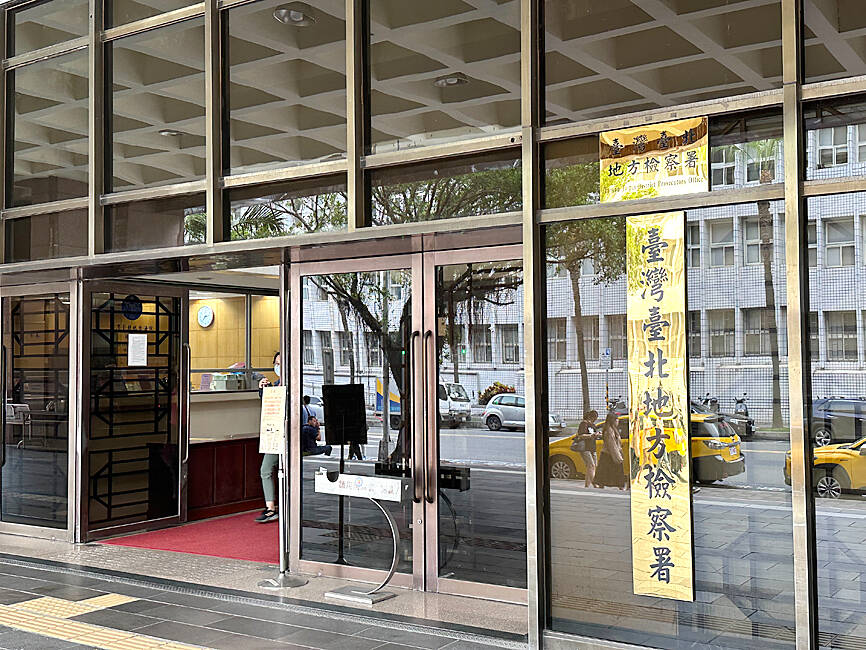The head of a Taiwan-based investment company surnamed Tseng (曾), along with 151 others, was indicted on Thursday for allegedly selling offshore funds in contravention of banking laws, among other offenses, the Taipei District Prosecutors’ Office said in a statement.
Tseng recruited people in Taiwan to illegally sell offshore funds, amassing more than NT$13 billion (US$397.19 million) from more than 800 investors, prosecutors said.
An investigation showed that on May 25, 2010, Tseng established the company and recruited 11 people as general managers, administrative vice presidents, deputy general managers, directors and supervisors, the statement said.

Photo: Wu Sheng-ju, Taipei Times
He later hired an additional 140 people as managers, deputy managers, assistant managers and sales personnel, it said.
Tseng and his associates promoted, solicited and sold offshore financial products without approval from the Financial Supervisory Commission (FSC), the statement said.
They guaranteed annual investment returns of 8 to 15 percent, claiming minimal or no risk of loss, and promised the return of principal upon maturity with additional agreed returns, prosecutors said.
Sales personnel took investors to Hong Kong to open accounts, they said.
Following instructions from sales personnel, the investors transferred funds for the products by exchanging foreign currency and remitting it to designated banks to buy offshore financial products, they said.
Investors would verify their portfolio’s performance through account statements provided by the company or by logging into a Web site, while the company would take commissions and referral fees from transactions, prosecutors said.
This continued until investors in February last year discovered that they were unable to redeem their principal or interest, resulting in the loss of their investments, the statement said.
The company allegedly defrauded 804 individuals with total investments exceeding NT$13 billion, the office said.
The office indicted Tseng and the 151 staff over contraventions of the Organized Crime Prevention Act (組織犯罪防制條例), illegal sale of offshore funds under the Securities Investment Trust and Consulting Act (證券投資信託及顧問法) and illegal banking operations under the Banking Act (銀行法).
The office said that three other suspects have absconded and been placed on a wanted list, while a request has been filed with the court to confiscate approximately NT$1.3 billion in assets.

SHIPS, TRAINS AND AUTOMOBILES: The ministry has announced changes to varied transportation industries taking effect soon, with a number of effects for passengers Beginning next month, the post office is canceling signature upon delivery and written inquiry services for international registered small packets in accordance with the new policy of the Universal Postal Union, the Ministry of Transportation and Communications said yesterday. The new policy does not apply to packets that are to be delivered to China, the ministry said. Senders of international registered small packets would receive a NT$10 rebate on postage if the packets are sent from Jan. 1 to March 31, it added. The ministry said that three other policies are also scheduled to take effect next month. International cruise ship operators

HORROR STORIES: One victim recounted not realizing they had been stabbed and seeing people bleeding, while another recalled breaking down in tears after fleeing A man on Friday died after he tried to fight the knife-wielding suspect who went on a stabbing spree near two of Taipei’s busiest metro stations, Taipei Mayor Chiang Wan-an (蔣萬安) said. The 57-year-old man, identified by his family name, Yu (余), encountered the suspect at Exit M7 of Taipei Main Station and immediately tried to stop him, but was fatally wounded and later died, Chiang said, calling the incident “heartbreaking.” Yu’s family would receive at least NT$5 million (US$158,584) in compensation through the Taipei Rapid Transit Corp’s (TRTC) insurance coverage, he said after convening an emergency security response meeting yesterday morning. National

PLANNED: The suspect visited the crime scene before the killings, seeking information on how to access the roof, and had extensively researched a 2014 stabbing incident The suspect in a stabbing attack that killed three people and injured 11 in Taipei on Friday had planned the assault and set fires at other locations earlier in the day, law enforcement officials said yesterday. National Police Agency (NPA) Director-General Chang Jung-hsin (張榮興) said the suspect, a 27-year-old man named Chang Wen (張文), began the attacks at 3:40pm, first setting off smoke bombs on a road, damaging cars and motorbikes. Earlier, Chang Wen set fire to a rental room where he was staying on Gongyuan Road in Zhongzheng District (中正), Chang Jung-hsin said. The suspect later threw smoke grenades near two exits

Taiwan has overtaken South Korea this year in per capita income for the first time in 23 years, IMF data showed. Per capita income is a nation’s GDP divided by the total population, used to compare average wealth levels across countries. Taiwan also beat Japan this year on per capita income, after surpassing it for the first time last year, US magazine Newsweek reported yesterday. Across Asia, Taiwan ranked fourth for per capita income at US$37,827 this year due to sustained economic growth, the report said. In the top three spots were Singapore, Macau and Hong Kong, it said. South